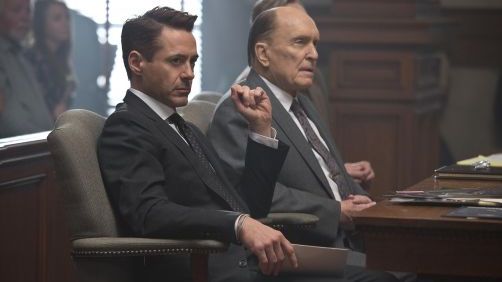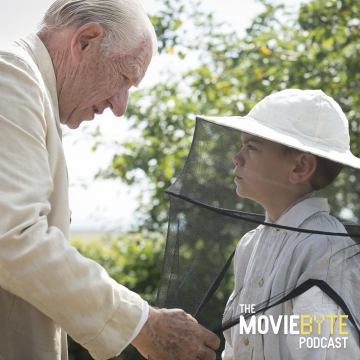
The death of your mother changes you in ways you don’t understand. Those who have not been through it have no way of fathoming the affect it has on your life. I freely admit that, though I had seen and spoken to my mother just hours before she passed, while Hank Palmer in The Judge had not seen her in years, this aspect of the story may have some amount of resonance with me that it did not with you. I don’t know.
Hot Shot
Robert Downey Jr. plays hot shot lawyer Hank Palmer who has (seemingly?) never defended an innocent man. And he knows it. He even tells people he’s fine with it. When the opposing lawyer for the opening scene case comes into the restroom to trash talk to Palmer and asks Hank how he can live with himself, how he can sleep at night, Hank references his near perfect life. He makes reference of his nice house, car, and his very fine looking wife (with words I shall not repeat here for the younger readers in my audience). In short, he tells the opposing attorney that he lives with himself and sleeps at night just fine.
As it turns out, this is all a lie. His life is not so great, he works around the clock, he’s in the middle of a divorce, and his kid knows exactly what is going on.
The worst part is, just as the trial in the opening of our film is starting, Hank receives a phone call — his mother has passed away and he needs a continuance for the trial.
He travels to middle of nowhere Indiana for his Mother’s funeral and receives no warm greeting from his father (Robert Duvall). In fact, it’s safe to say his father would be happier if he were not there. And Hank Palmer is glad to just hightail it out of nowhereville Indiana at his first opportunity. But he’s called back just as his plane is taking off because his father has been arrested.
Hank’s father, as we found out, has been a judge in this hick town Indiana for 42 years. The arrest of the venerable man is something of a blow — and he’s being charged with murder. But he believes in the law and the system and he’s a terrible client for his first lawyer (he won’t let his son defend him in court at first), and when it comes to it, he’s a terrible client for his son when he finally acquiesces to that. The worst part is that Judge Palmer is missing time when the murder happened.
Not a Murder Mystery
It might surprise you to learn that this film is not a murder mystery. This film is about reuniting father and son and repairing their relationship. Though Judge Palmer is missing time when the murder happened because of the chemo he is (secretly) taking, it’s actually fairly obvious what happened. Security footage places Judge Palmer, and a man fresh out of a prison sentence the Judge assigned, at the same grocery store. Security footage shows that the judge followed the fresh-out-of-prison man. Many years ago, the Judge had been soft in the sentencing of this man, and as repayment, he murdered his girlfriend. The Judge considered it the biggest mistake of his career and the man he thought to be a piece of low life scum. The case is really open and shut regardless of what Hank Palmer makes of it throughout the film.
But the story is about the estrangement of Hank Palmer. It’s essentially a family drama. But don’t let that put you off from the film because it’s a good one.
I think all sons are a disappointment to our fathers. Every one of us men, in some way, are a disappointment to our fathers. This is the nature of the human condition. Our fathers have hopes, dreams, aspirations for their sons. They want those sons to make something of their lives, and before you know it, they have a future and a vision mapped out. The trouble is, as sons grow up they develop their own vision for what the future might hold. We all have a tendency to stubbornly cling to that which we hold dear.
To top this off, Hanks was essentially a rough and tumble rebellious son who had some run-ins with the law and had a wreck which injured his older brother in such a way as to crush his and his father’s dreams of playing baseball on a professional level. His father — as a judge in a case involving his son — sentenced him to juvenile detention. All these things added up to make for a very bad father/son relationship and they basically hate each other.
A Grudging Respect
How do you transition out of years of hate and bitterness? If you can get inside the crusty exterior, Judge Palmer actually loves his son and is proud of him. But he can’t tell his son that, and he can’t be civil toward him — or barely so anyway. Meanwhile, under the sarcastic and hardened exterior, Hank wants nothing more or less than his father’s respect and approval. He craves it in a way I don’t think even he understands. And yet I think we all understand it. It’s built in to us. We want the approval of our fathers. We want their counsel and guidance. We want their friendship. What we sometimes get is disapproval and gruffness.
When the Judge is asked who he thinks the best lawyer is, he answers with some guy he had seen on some case. But at the end of the film, he tells Hank he lied, that the best lawyer he had ever seen was sitting there with him. Even now, writing this, it chokes me up. It’s a story that resonates. Hank had finally won the respect — or the admission of respect — from his father.
Throughout the unfolding of the story, we find out in fact that, his father had become distant and cold because he saw in his son a rebellion — he saw the road his son was going down, and he did not want to reward such behavior. This is all tied (quite brilliantly in my opinion) to the case and the murder trial going on with the Judge. The man the Judge allegedly killed was the man who 20 years earlier Judge Palmer had been lenient with and given him only 30 days for shooting out the windows of his girlfriend’s home. The man went on to murder his girlfriend almost as soon as he got out. The Judge had seen traces of his own son, perhaps one possible future version of his own son and he went soft. He wanted to believe him to be a sincere man and one sorry for what he had done. And this was a major mistake.
Judge Palmer then realized that the softness was in error and determined not to let the same thing happen to his son. Though he went too far, though he caused a rift, he did it for love of his son.
It’s a gut-wrenching and heart felt story.
Charisma and Sarcasm vs. Crusty Old Man
It should be obvious I suppose, but the success of this film can and rightly should be attributed to Robert Downey Jr. Downey Jr. is pretty good in whatever he’s in, but there are certain roles one expects him to play. He does variations on a theme. For this film, the variation of the theme he found was spot on. Though the sarcasm and personality may be the same, I did not feel like I was watching him play Iron Man without the suite, or Sherlock Holmes. That was one of the things I wasn’t sure about going in and I was pleased with the result. We’ve seen Downey Jr. play the troubled super-hero, and we’ve seen him save the day. We’ve even seen him grow his character in the role of Iron Man. But what we haven’t see yet is the performance he gave here. He started out with the bitter and hurt exterior, but he progressed to the weeping school boy seeking only the approval of his father. And when he broke down in court that he wasn’t able save his father from prison, it was a deeply moving scene. Who would have thought the caustic humor and satire could change to such an extent to affect us in such a way? His performance was flawless.
No less flawless a performance was that of Robert Duvall. His role as Boo Radley in the 1962 film, To Kill a Mocking Bird, may have put him on the map, but these many years later he’s still got it. This film could not have happened without Downey Jr. but neither could it have happened without Robert Duvall. He commanded the screen whenever he appeared — from his cold shouldering of his son to the sick crawling to the toilet and soiling himself in one of the most humiliating scenes I believe I have ever seen, his ability to elicit both empathy and at the same time foster a hearty dislike for being so pig-headed was astounding.
An Astronaut Farmer, or a Lawyer?
As I feared going in, the part of Dwight Dickham played by Billy Bob Thornton was not great. Surprisingly though, I attribute this to scripting issues more than acting ability. Thronton will never be one of the greats in my estimation, but his performance was passable. My issues here come down to a lack of characterization in scripting. He comes in as the evil bad guy lawyer determined to see an old man go down in flames because he deems him a self-righteous prick. Unfortunately we don’t get much more than that.
We do fortunately get somewhat of a redemption at the very end of the film. We get a little bit of facial expression from Dwight that maybe he’s made a mistake, and we see a signature from him petitioning for a compassionate release. But we never found out what motivated any of this.
Supporting Performances
I can’t think of any other performance complaints. Emma Tremblay playing Hank’s little girl was as cute as a button. Vincent D’Onofrio as Hank’s brother turned in a very solid and nuanced performance. Vera Farmiga was brilliant, wild, unruly, still in love with Hank from their teenage fling. She hit every note just right.
Okay, there was one other minor complaint: Dax Shepard’s character C.P. Kennedy playing Judge Palmer’s first choice as lawer was just a bit over-the-top weird.
Muddiness
The other complaint that I had with this film is a bit of muddiness regarding the circumstances surrounding our main character and his relationships. In the beginning of the film Hank Palmer tells an opposing lawyer what a great life and wife he has. But then we see that he’s getting a divorce.
Later we see that Hank is schmoozing it up with a barely legal teen girl in the bar in his hometown Indiana.
Then later we see him hanging and oogling his old teenage fling who turns out to be the barely legal teen’s mother.
The trouble in all this is I didn’t know what I wanted for my main character. I suppose that the point is life can be messy and relationships can be fraught with complication. We discovered the reason for the pending divorce is that trophy wife cheated on Hank, but then we see him messing around and one can hardly blame her (well okay, I can always blame anyone who cheats, but you get what I mean). It was all a bit too muddy for me and I wanted more clarity.
I will say though, that all this situation did provide for some of the more funny yet heart-breaking moments of clarity between father and daughter. She’s not stupid, she knows what’s going on.
Everyone wants Atticus Finch until there’s a dead hooker in a bathtub.
If you don’t go see this movie for any other reason, go see it for that line. I jest, but the writing of the film is pretty clever and I found the film to be quite wonderful. It was heartfelt, it was captivating, and it was darn good human drama. I keep reading reviews talking about what a poor courtroom drama this film is, but the trouble is I think they are looking at it wrong. This is not a courtroom drama, this is a family drama with a courtroom in it. Yes, I enjoyed some of the courtroom, but the film even telegraphed how much the film was not about the courtroom by sort of speeding through some of the procedures, muting out the sound, and more. This film is about two central characters and their human failings, and how father and son learn to respect and love each other.


